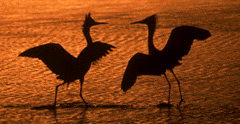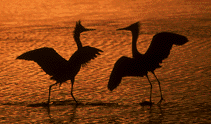Arthur Morris / Birds as Art
Bulletins and Notes Archive
Click any
image to
enlarge it
|
Bulletins and Notes Archive
|
BIRDS AS ART ON-LINE BULLETIN #44 February 6, 2001
- Velvia or Provia F100?
- JRF Protective Neoprene Lens Covers
- Lens Cleaning Fluid
- Two Florida Offerings From My One and Only Photography Teacher
Velvia or Provia F100?
Here is another frequently asked question: "l am not clear about when
you use Velvia and when you use Provia F100. Can you please shed some
light (pardon the pun ) on that?"
Though the choice is often a
difficult one, here are my here are my thoughts:
I use Velvia:
- As much as possible. For my taste, its brilliant
color palette is simply unsurpassed.
- In low light and on dreary days
when I am NOT using flash.
- In warm light (when I have sufficient shutter
speed, and subject movement is not an important consideration).
- From 1/2
hour to roughly 1 1/2 or two hours after sunrise on clear mornings and from 1
1/2 to 2 hours before sunset on clear afternoons.
- Right at sunrise, and
then again right at sunset (again, when I have sufficient shutter speed, and
subject movement is not an important consideration).
I use Provia F100 often pushed 1 stop to EI 200 or 2 stops at EI 320
(Yes! Rate the film at EI 320. Compensate as you normally would,
then tell the lab to push the film 2 full stops (not 1 2/3
stops).
- On dreary
days when I am using flash. I have noticed over the past few months that
many of my fill flash images made with this film are overexposed. (This
happens when using fill flash exactly as I would when using Velvia: -2/3 stop
for middle tones subjects, -1 or -1 1/3 for white, yellow, or light toned
subjects, -1/3 stop for dark subjects, and 0 or
even +1/3, for very dark or
black subjects. I will begin experimenting with using less fill flash on
my upcoming SW Florida IPT trip. )
- In warm light when I need extra
shutter speed and subject movement might be a consideration.
- At normal
(ISO 100) two hours after sunrise or before sunset on clear days. Provia
F100 handles the contrast in bright scenes better than Velvia.
- In
extremely low EV situations where Velvia simply has no chance to even register a
flock of birds in flight on the film.
- Often, when I am using the 600
IS/2X TC combination, or when stacking TCs.
Remember, however, that film
choice is strictly personal.
JRF Protective Neoprene Lens Covers
On the Bosque IPTs in November 2000, both my 500 and 600mm Canon IS lenses
were wearing their JRF Protective Neoprene Lens Covers. The covers are
individually designed and manufactured for each of these lenses. The
camouflage-patterned neoprene covers protect your lens from the nicks, dings,
and scratches that scar our expensive investments. The camo also takes the
edge off the effect of swinging a big white lens off your shoulder after
carefully approaching a free and wild bird, somewhat
reducing the chance that
you will cause the bird to flee.
The covers are now
available from BIRDS AS ART for $65.00 each (Florida residents please add 6%
tax) plus $5.00 shipping and handling. (The covers are not and will not be
available for any Nikon telephotos. If they were, we will carry
them.) I have only ten of each in stock, and no more will be available
until May 2001; so if you would like one, please order ASAP by check or
paypal.com. (See the web site for more on paypal.com)
Lens Cleaning Fluid
I am often asked what type of lens cleaning fluid I use to clean my optical
equipment. I use LENS CLENS #1 as both a lens and equipment cleaning
fluid. It goes by part # 20001-01 which is a 13 1/4 oz. bottle. I
think that the small refillable squirt bottle is part of the package. The
contact telephone number is 714-535-2271.
Two
Florida Offerings From My One and Only Photography Teacher
Milton Heiberg, who taught the NYC Audubon Nature
Photography course that comprises my only photographic training, is teaching
Close-Up Nature Photography course at Leu Gardens in Orlando, Florida on
February 16, 17, & 20, 2001. The course includes a Friday evening lecture on
equipment and technique, a Saturday morning of in-the-field photography at the
gardens, and a review and critiquing session on Tuesday evening. The
fee is $70 ($62 for Leu Garden members). Call 407-246-3621 to register, or
E-mail Milton for additional details at photonat@worldnet.att.net On the
weekend of February 23-25, 2001, Milton will lead an Everglades Photography
Workshop for the Crealde School of Art which will include a pre-trip meeting on
Wednesday, February 21 and a post-trip review and critique on Tuesday, February
27. The tuition is $310 ($285 for Crealde members). If you would like to
spend a weekend in the Everglades with this 30 year veteran photographer
photographing birds and wildlife, please call the Crealde School of Art at
407-671-1886 or E-mail Milton for additional details atphotonat@worldnet.att.net
Lastly, Best and Great Picture Making to all,
Arthur Morris/BIRDS AS ART
|
|


